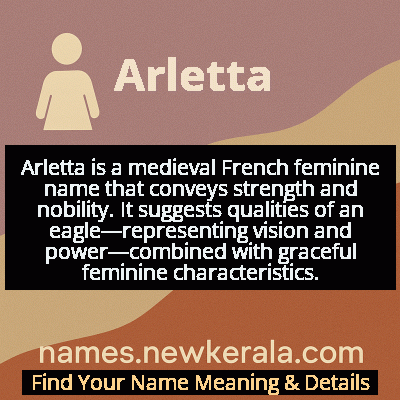Arletta Name Meaning & Details
Origin, Popularity, Numerology Analysis & Name Meaning of Arletta
Discover the origin, meaning, and cultural significance of the name ARLETTA. Delve into its historical roots and explore the lasting impact it has had on communities and traditions.
Name
Arletta
Gender
Female
Origin
French
Lucky Number
5
Meaning of the Name - Arletta
Arletta is a medieval French feminine name that conveys strength and nobility. It suggests qualities of an eagle—representing vision and power—combined with graceful feminine characteristics.
Arletta - Complete Numerology Analysis
Your Numerology Number
Based on Pythagorean Numerology System
Ruling Planet
Mercury
Positive Nature
Adventurous, dynamic, curious, and social.
Negative Traits
Restless, impatient, inconsistent, prone to indulgence.
Lucky Colours
Green, white.
Lucky Days
Wednesday.
Lucky Stones
Emerald.
Harmony Numbers
1, 3, 9.
Best Suited Professions
Sales, marketing, travel, entertainment.
What People Like About You
Versatility, charisma, adventurous spirit.
Famous People Named Arletta
Arletta of Falaise
Historical Figure
Mother of William the Conqueror, influencing Norman history
Arletta de Champagne
Noblewoman
Medieval patron of arts and regional politics
Arletta Dubois
Literary Character
Representation of medieval ideals in French romantic literature
Name Variations & International Equivalents
Click on blue names to explore their detailed meanings. Gray names with will be available soon.
Cultural & Historical Significance
The name reflects the cultural blending of Frankish and Norman traditions in medieval France, embodying both the elegance of French courtly culture and the rugged strength of Norman warrior society. Its usage declined after the Renaissance but experienced revivals during periods of romantic medievalism in the 19th century, when historical names gained popularity among the bourgeoisie seeking to connect with France's noble past. The name's cultural significance lies in its representation of the powerful but often overlooked women who shaped medieval European history through their roles as mothers, managers, and political actors.
Extended Personality Analysis
Individuals named Arletta are often perceived as possessing a unique blend of traditional grace and inner strength. They typically exhibit a quiet confidence and determination that reflects the name's noble origins. Arlettas are frequently described as resilient and principled, with a strong sense of personal integrity that guides their decisions and relationships. Their medieval roots suggest a personality that values loyalty, honor, and tradition while maintaining an independent spirit that allows them to navigate modern challenges with wisdom drawn from historical perspective.
Many Arlettas display natural leadership qualities tempered with compassion, making them effective in positions where they can guide and protect others. They often possess keen intuition and observational skills, allowing them to navigate complex social situations with wisdom and tact. The name's historical connection to powerful medieval women suggests a personality that balances feminine grace with formidable inner strength, creating individuals who are both nurturing and capable of facing significant challenges. This combination makes Arlettas particularly adept at building lasting relationships and creating stable environments where others can thrive.
Modern Usage & Popularity
In contemporary times, Arletta remains a relatively rare but cherished name, primarily used by parents seeking a distinctive name with historical depth and European elegance. While it never reached the popularity of more common French names, it maintains a steady presence among families with French heritage or those drawn to medieval names. The name has seen minor resurgences during periods of interest in historical and vintage names, particularly in France, Quebec, and among Francophile communities worldwide. Modern usage often emphasizes the name's unique combination of traditional roots and distinctive sound, making it appealing to parents looking for names that are both classic and uncommon. Recent years have shown increased interest in medieval names, which may contribute to Arletta's gradual rediscovery by new generations seeking names with substance and historical resonance.
Symbolic & Spiritual Meanings
Symbolically, Arletta represents the fusion of strength and grace, drawing from its etymological connections to the eagle—a universal symbol of vision, freedom, and power. The name embodies the concept of noble endurance, suggesting an individual who can soar above challenges while maintaining dignity and purpose. In metaphorical terms, Arletta signifies the bridge between earthly practicality and higher ideals, much like the eagle that flies high but remains connected to the earth. The name carries connotations of historical continuity, linking modern bearers to centuries of tradition and feminine strength. It symbolizes the quiet power that operates behind the scenes, the strength that supports great achievements, and the enduring quality of noble character across generations. The symbolic resonance of Arletta speaks to the idea that true strength often manifests as resilience, wisdom, and the ability to nurture greatness in others while maintaining one's own identity and purpose.

